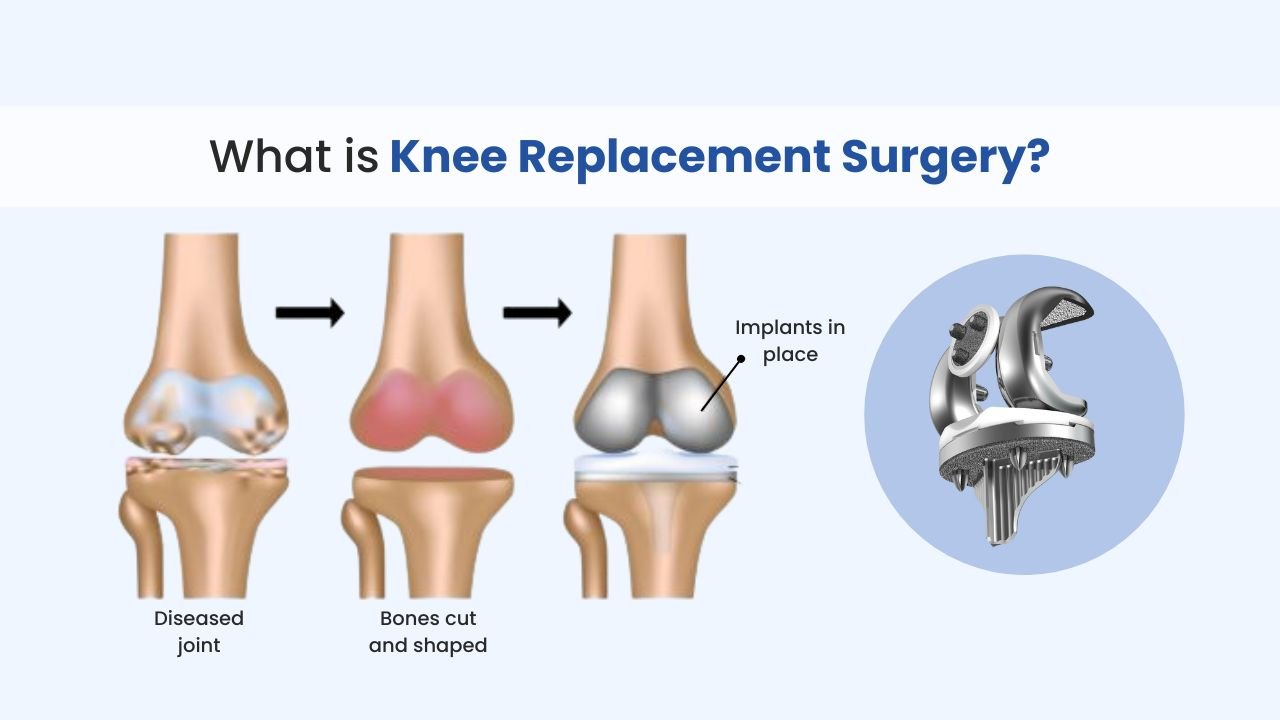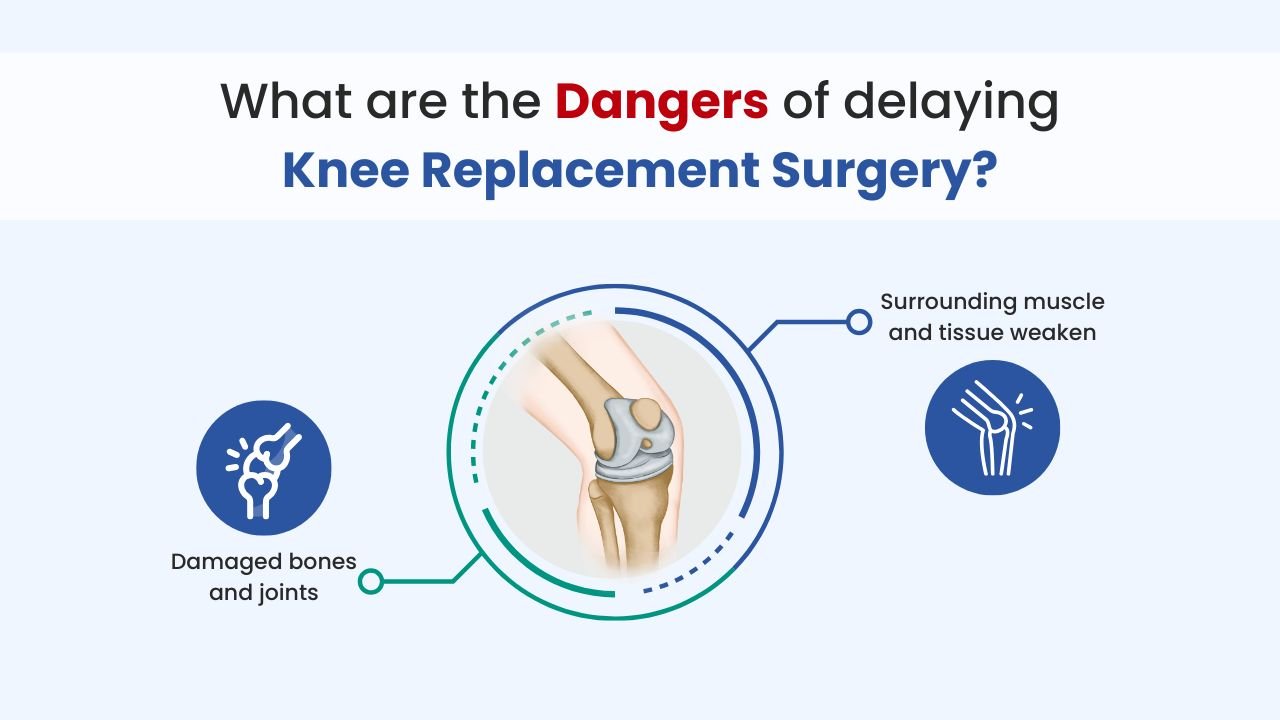Home Blogs Orthopedics Disadvantages of Knee Replacement Surgery

Knee replacement aims to relieve severe arthritis pain, but recovery might take time and cause swelling, mobility limitations, infection, blood clots, implant wear, nerve or ligament damage, and so on. However, managing these symptoms is are important factor to reduce the risk of complications.
While dealing with knee pain, there is a range of treatment options available for patients, such as lifestyle changes, medications, medical procedures, and surgical interventions.
When symptoms are severe, then selecting total knee replacement is the best option for the cause, but before making a final decision, one must be aware of the potential disadvantages of knee replacement surgery.
In this article, we will discuss the disadvantages of knee replacement and related information.

Knee replacement surgery is also known as knee arthroplasty, which is a surgical procedure to resurface a knee that is damaged by arthritis. In this procedure, metal and plastic pieces are placed over the ends of the bones in the knee joint and on the kneecap. This surgery is usually an option for people who have serious arthritis or a bad knee injury.
The post-replacement recovery is not easy because in that period, you may undergo physical therapy for months to regain mobility and strength. During this period, you may experience swelling, pain, and stiffness after surgery because the disadvantages of Knee Replacement Surgery often begin with this challenging recovery period.
Among the disadvantages of Knee Replacement Surgery, mobility limitations are common.
Infection is another disadvantage of knee replacement surgery, so if you experience this, then see your healthcare provider.
The knee joint (prosthesis) doesn’t last forever and eventually needs to be replaced again, which is called revision surgery.
Blood clots or DVT are possible complications after knee surgery due to how blood flows and clots after surgery, yet it's not a serious issue. But if it's causing pain or swelling, then the doctor will prescribe you medicines to help.
Deep vein thrombosis (DVT) is a serious health issue where a blood clot forms in a deep vein, usually in the legs or pelvis. If it isn't treated, this condition can cause a very dangerous problem called a pulmonary embolism, where the clot can travel to the lungs and block the blood flow, which is another serious disadvantage of Knee Replacement Surgery..
There are some common side effects of anesthesia, which include vomiting, dizziness, and breathing difficulties. However, cognitive dysfunction can occur in patients over 60 years of age.
Its major complication after joint replacement surgery is when the artificial joint separates from the bone, which requires another surgery.
Artificial knee joints include titanium or a cobalt chromium-based alloy, and the bone cement is a proper epoxy; however, patients can be allergic to the prosthesis, the cement, or both.
After knee replacement surgery, some people may experience nerve damage. This can lead to feelings like numbness, weakness, or tingling in the leg or foot. In some cases, a person might have trouble lifting their foot, which is known as foot drop. It can also feel like there's a burning or prickling sensation in the area.
Tendons and ligaments can get damaged during knee replacement surgery, which causes pain, restricts movement, and instability.
If you are concerned about the disadvantages of knee replacement surgery, then there are some alternatives that you should consider, which include:

While worrying about the disadvantages of Knee Replacement Surgery can lead to delays, which have their dangers, including:
The longer you delay your surgery, the more wear and tear will occur. And because of that reason, the bones at the joint grind against each other rather than moving smoothly.
Limited mobility and continued inflammation can cause pressure that can prevent proper movements, weaken the muscles.
If the surgery is delayed, then you might experience pain, but there are several strategies can can help in managing pain, including:
FAQs
Knee replacement surgery is often successful in reducing pain and improving mobility, but it does carry some risks and complications, which include infection, blood clots, nerve damage, and implant failure.
Yes, for many patients, after surgery experience significant improvement in their lives. Additionally, this procedure reduces pain, improves mobility, and allows patients to return to their normal activities they enjoy.
Pain and swelling are the most common problems after knee replacement surgery. It's normal after surgery, but it's important to manage ten effectively and monitor for any signs of complications.
After surgery, many patients can return to their normal activities, but there are some limitations, like you should avoid running, jumping, and contact sports considered to be avoid.
Patients with certain medical conditions, like poor skin condition around the knee, or younger or overweight patients.
Well, it's possible for some patients to run after surgery, but it's not recommended due to potential damage to the artificial joints.
While knee replacement surgery is generally considered safe, there are some potential risks, which include infection, blood clots, and improved mobility after surgery.
Yes, climbing stairs is possible and safe after surgery; however, it might take some time to regain full capability.
Yes, there are several alternatives to surgery which include physical therapy, injections, weight management, bracing, and newer treatments like genicular artery embolization.

Written By
I'm a content writer at Mejocare.com, where I create easy-to-understand and informative healthcare content. With 4+ years of experience, I help people learn about important health topics and connect with healthcare providers through clear and engaging writing.
I focus on making complex medical information simple and useful, ensuring that readers can easily find the answers they need.
What I do:
I’m committed to helping Mejocare share reliable health information with its readers.
SOURCE
HISTORY
At Mejocare, we prioritize accuracy and reliability. Our content is based on peer-reviewed studies, academic research, and medical associations. We avoid tertiary references. Learn more in our editorial policy. Trustworthy health information for you.
https://www.txknees.com/patient-resources/blog/5-disadvantages-of-knee-replacement-surgery/ para no 1,3 https://centenoschultz.com/disadvantages-of-knee-replacement-surgery/ para no 3,4,5,6,7,8,9,10,11,12,13,14 https://versusarthritis.org/about-arthritis/treatments/surgery/knee-replacement-surgery/ para no 10 https://drsartawi.com/en/delaying-knee-joint-replacement-what-are-the-risks/ para no 4,5
CURRENT VERSION
Our care team can help you.
